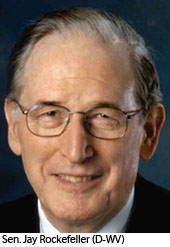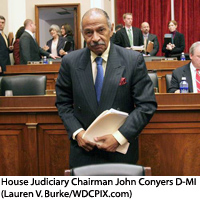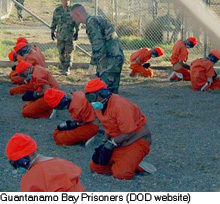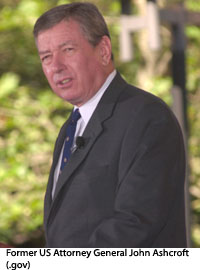The more we see of the back-and-forth between the Department of Justice and the CIA regarding the torture program a few years ago, the more it becomes clear that everyone knew it was a little shady.
The American Civil Liberties Union yesterday released three previously undisclosed memos about the torture program from 2002 to 2004, which it obtained as part of its ongoing FOIA lawsuit with the DOJ seeking records on the treatment of prisoners in U.S. custody overseas.
One memo in particular appears to instruct the CIA in what agents should say if anyone raised the specter of criminal charges. For example: "To violate the statute, an individual must have the specific intent to inflict severe pain or suffering. ...absence of specific intent negates the charge of torture."
"It read like an attorney preparing a mob client for a confrontation with the police," said Jonathan Turley, a law professor at George Washington University. "Why on earth would you instruct interrogators on the meaning of 'specific intent' unless you wanted to coach them as to what to say when confronted?"
The very existence of this extensive, documented legal exchange between the DOJ and the CIA underscores the intelligence officials' concern about the legality of their own program, said Herman Schwartz, a former civil rights attorney and law professor at American University.
"The CIA people knew this was shaky stuff -- that's why they kept asking for memos from the Justice Department saying this was OK. They were very scared they would have to face up to this in some way later on," Schwartz said in a telephone interview.
An August 2002 memo from DOJ came about the same time the attorney general had laid out a definition of torture so narrow as to only involved things like "organ failure." Specifically, the CIA wanted to know, how does that apply in practice?
Then-Assistant Attorney General Jay Bybee wrote to the CIA: "You have asked for this office's views on whether certain proposed conduct would violate the prohibition against torture found ...[in] United States Code."
Virtually all of the "proposed conduct" was redacted with large black marks covering whole pages. In fact, more than 80 percent of the 23 pages released to the ACLU were blacked out, apparently concealing the names of agents involved in the program and the specific techniques in question.
The memo spells out a legal logic that rests not on the facts of what may occur during interrogation, but the "defendant's" state of mind (the defendant being anyone who may actually get charged with torture).
...If a defendant acts with good faith belief that his actions will not cause such suffering, he has not acted with specific intent. A defendant acts in good faith when he has an honest belief that his actions will not result in severe pain or suffering.
So, hypothetically, an interrogator gets up in front of a grand jury and tells them he had the "good faith" belief that a few hours of waterboarding was not going to cause "severe pain or suffering."
What if a jury doesn't buy it? The memo goes on to say: "Although an honest belief need not be reasonable, such a belief is easier to establish where there is reasonable basis for it."
About six months later, Tenet sent a memo to the Department of Justice's Office of Legal Counsel informing them that the interrogators were keeping copious records.
"In each interrogation session in which enhanced Technique is employed, a contemporaneous record shall be created setting forth the nature and duration of each technique employed, the identities of those present."
Turley called that a "C-Y-A memo."
It wasn't long after that that then-Attorney General John Ashcroft rescinded the key 2002 memos that provided hte legal foundation for the torture programs.
Maybe the most important question raised by these new memos involves the records of torture sessions that Tenet referred to.
"We know there are records of what happened. Then the next question is: Will they come to light and to what extent?" Schwartz said. "I have to wonder what would be the significance of a Democratic president? If he puts his person in as head of the CIA and he puts his person in at head of DOJ? Will they as most executives are likely to do, continue to cover up what happened because of bureaucratic imperative? Or the alternative -- to provide this to Congress?"












 For Sampson, Hiring At DOJ Was All Republicans All The Times
For Sampson, Hiring At DOJ Was All Republicans All The Times Conyers Considers "Criminal Referral" For Gonzales, Other DOJ Officials
Conyers Considers "Criminal Referral" For Gonzales, Other DOJ Officials Torture Memos Makes DOJ Sound Like Mob Attorney
Torture Memos Makes DOJ Sound Like Mob Attorney Ashcroft Cites Executive Privilege, Discusses Waterboarding with House Judiciary
Ashcroft Cites Executive Privilege, Discusses Waterboarding with House Judiciary Ashcroft: Sometimes I Confuse What People Tell Me With Reality
Ashcroft: Sometimes I Confuse What People Tell Me With Reality White House Insisted On Bush Loyalists For Top DOJ Posts In 2003
White House Insisted On Bush Loyalists For Top DOJ Posts In 2003 IG Report Implicates Two Former DOJ Officials
IG Report Implicates Two Former DOJ Officials


